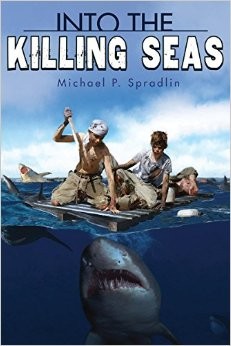Writers are asked all the time ‘what inspired you to write this book?’ Into the Killing Seas, my newest novel, is told through the eyes of a young boy who, along with his brother, stows away about the USS Indianapolis. Almost two days out of port, the ship was sunk by a Japanese submarine.
Two torpedoes tore the ship nearly in half. It sank so quickly only 900 of the 1200 man crew were able to abandon ship. Most of them were burned and wounded. They floated in the ocean nearly five days before they were spotted and rescued. They survived exposure, dehydration, starvation, and relentless heat and rolling seas. And they had the great misfortune to sink in some of the most heavily shark infested waters on earth.
Scientists have called it the worst human-shark encounter in history. Of the 900 men who made it off the ship, only 317 were pulled from the water. It was the worse disaster at seas in US Naval history. It was, by any definition, a horrific event.
What inspired me to write Into the Killing Seas? First, like any writer, my primary goal is to tell the best story I possibly can. And in the case of the Indianapolis disaster, to introduce young readers to an important historic event through historical fiction.
There is a lot of action and tragedy in Into the Killing Seas. Booklist called it “grim and vivid.” And it is very difficult to ‘sanitize’ a shark attack. Which brings me to the inspiration question. Why write about such a horrible event, a war, death and destruction? Especially in a book for children?
It’s my own opinion, but I believe young readers deserve honesty and truth, just as much as adult readers. Writing a book like Into the Killing Seas gives readers a glimpse of a true event that was beyond horrible. And the horribleness is the point. My goal in writing historical fiction for young readers is to try and give them an understanding that war and the things that go with are awful. It is not a movie or a video game. It is at times both the best and worst of humanity. There is no reset button. Sometimes men and women fight and die. And in my opinion, I think it’s important that young readers learn that reality.
gives readers a glimpse of a true event that was beyond horrible. And the horribleness is the point. My goal in writing historical fiction for young readers is to try and give them an understanding that war and the things that go with are awful. It is not a movie or a video game. It is at times both the best and worst of humanity. There is no reset button. Sometimes men and women fight and die. And in my opinion, I think it’s important that young readers learn that reality.
And that’s my question. Does giving kids a glimpse of the reality of war, or the truth of history provide them with a valuable lesson? We have a tendency these days to want to protect our children from the harshness of life. But life is not always kind. Does opening their eyes to events like the Crusades or World War II make them better prepared to understand the world as they become adults? I’d love to know what you think about using historical fiction to introduce young readers to history.





